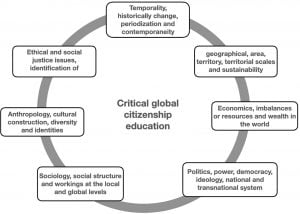
Globalization has transformed the way we live, work, and interact. As the world becomes increasingly interconnected, the concept of global citizenship has gained prominence. Global citizenship goes beyond national borders and encompasses a sense of belonging to a broader global community. It involves recognizing the interconnectedness of our world, understanding and respecting diverse cultures, and taking responsibility for addressing global challenges. International education plays a pivotal role in nurturing global citizenship by providing individuals with the knowledge, skills, and experiences needed to become active, responsible global citizens.
Defining Global Citizenship
What Does Global Citizenship Mean?
Global citizenship is a multifaceted concept that can be challenging to define. At its core, it signifies a commitment to understanding and addressing global issues while respecting and valuing cultural diversity. It involves a sense of shared responsibility for the well-being of the planet and all its inhabitants. Global citizens view the world as an interconnected whole, transcending national, cultural, and political boundaries.
Characteristics of a Global Citizen
A global citizen exhibits several key characteristics, including empathy, cultural openness, and a commitment to social and environmental responsibility. Global citizens actively engage in the world, seek to make a positive impact, and recognize that local actions can have global consequences. They are lifelong learners, continuously seeking to expand their knowledge of global issues and cultivate an understanding of diverse perspectives.
International Education: A Catalyst for Global Citizenship
Exposure to Diverse Cultures
One of the fundamental ways international education promotes global citizenship is by exposing individuals to diverse cultures. Whether through study abroad programs or interaction with international students, exposure to different customs, traditions, and worldviews fosters cultural openness and appreciation. This exposure encourages individuals to see the richness of human diversity and to embrace it as an asset rather than a difference to be feared.
Fostering Empathy and Understanding
Empathy is a cornerstone of global citizenship. International education helps individuals develop empathy by allowing them to walk in the shoes of people from different backgrounds. This firsthand experience can lead to a greater understanding of the challenges and opportunities faced by others around the world. Through empathy, global citizens are motivated to take action to alleviate suffering and promote social justice.
Global Perspective Through Education
International education equips individuals with a global perspective. It encourages students to think critically about global challenges, such as climate change, poverty, and social inequality. This broader perspective leads to a deeper understanding of the world’s interconnectedness and the recognition that solutions to global problems require collective efforts.
Learning from Different Educational Systems
Contrasting Educational Approaches
International education allows individuals to learn from different educational systems. Contrasting teaching methods, curricula, and assessment practices enable students to appreciate the strengths and weaknesses of various approaches. This comparative analysis can lead to the adoption of innovative ideas and best practices from around the world.
The Value of Cross-Cultural Learning
Cross-cultural learning is a valuable outcome of international education. By studying alongside peers from different countries, individuals gain insights into the diverse ways people learn, think, and solve problems. This cross-cultural exchange enhances their adaptability and creativity in addressing global challenges.
Language Learning and Communication Skills
The Role of Language in Global Citizenship
Language is a powerful tool for fostering global citizenship. Proficiency in multiple languages enables individuals to communicate with people from diverse linguistic backgrounds. Language skills break down barriers and facilitate understanding, making it easier to collaborate on global issues.
Effective Communication Across Borders
International education emphasizes effective communication skills. This includes not only linguistic competence but also the ability to convey ideas, negotiate, and build relationships with people from different cultures. Effective communication is crucial for addressing global challenges, as it enables individuals to work collaboratively on solutions.
Global Issues Awareness
Educating about Global Challenges
International education is a platform for educating individuals about global challenges. It raises awareness about issues such as climate change, human rights violations, and poverty. This education empowers individuals to become informed advocates for positive change.
Encouraging Social Responsibility
Global citizenship is intertwined with social responsibility. International education encourages individuals to take responsibility for addressing global issues. It instills a sense of duty to contribute to the betterment of society, both locally and globally. This can manifest in activities such as volunteering, activism, or sustainable practices.
Study Abroad Programs and Exchange Opportunities
Benefits of Studying Abroad
Study abroad programs are a quintessential aspect of international education. They offer students the opportunity to immerse themselves in a foreign culture, experience a different educational system, and develop cross-cultural skills. Studying abroad broadens horizons and fosters a global perspective.
Cultural Exchange and Personal Growth
Cultural exchange is a significant benefit of study abroad experiences. Students have the chance to interact with local communities, share their own culture, and build lifelong connections. This personal growth enhances their ability to adapt to diverse environments and appreciate different ways of life.
Promoting Tolerance and Inclusivity
The Impact of International Education
International education contributes to the promotion of tolerance and inclusivity. By exposing individuals to different cultures and belief systems, it challenges stereotypes and prejudices. It encourages individuals to respect and value diversity, fostering a more inclusive world.
Combatting Stereotypes and Prejudices
Stereotypes and prejudices are often rooted in ignorance and misunderstanding. International education counters these biases by providing firsthand experiences that challenge preconceived notions. It promotes open-mindedness and respect for all people, regardless of their background.
Building International Networks
Expanding Social and Professional Connections
International education builds international networks. Students form friendships and professional connections with peers from around the world. These networks can be invaluable for future collaborations, both personally and in the professional sphere.
The Role of Alumni Networks
Many educational institutions have alumni networks that continue to connect individuals with international experiences. These networks provide ongoing opportunities for engagement, mentorship, and support.
Global Citizenship and Career Opportunities
Attracting Employers with a Global Mindset
Global citizenship enhances career prospects. Employers value individuals who possess a global mindset and cross-cultural competence. These skills are increasingly sought after in an interconnected world.
International Experience as a Career Asset
International experience is a valuable asset on a resume. It demonstrates adaptability, resilience, and the ability to work in diverse environments. It can open doors to job opportunities that involve international travel or collaboration.
Overcoming Challenges in International Education
Cultural Shock and Adaptation
International education is not without challenges. Culture shock, for instance, is a common experience for students studying in a foreign country. Adapting to a new culture, language, and educational system can be overwhelming.
Financial Considerations
Cost can be a barrier to international education. Tuition fees, living expenses, and travel costs can add up. Scholarships and financial aid options are available to help mitigate these expenses.
Promoting Global Citizenship Locally
Bringing Global Perspectives Home
Global citizenship is not confined to international experiences. It can also be promoted locally. Individuals can bring global perspectives home by sharing their experiences and engaging in activities that promote diversity and inclusivity.
Volunteering and Community Involvement
Volunteering and community involvement are ways to promote global citizenship locally. Individuals can participate in initiatives that address local issues with a global perspective in mind.
Conclusion
The journey of global citizenship is ongoing and transformative. International education equips individuals with the knowledge, skills, and experiences needed to become active, responsible global citizens. As they learn about diverse cultures, develop cross-cultural skills, and engage with global issues, they become advocates for positive change on a local and global scale. Embracing global citizenship is a journey that not only enriches individuals but also contributes to a more interconnected and harmonious world.




